Table of Contents
What is B2B Saas?
B2B SaaS (Software as a Service) is a type of software version or model that provides businesses with access to cloud-based applications over the Internet. These applications are typically hosted and managed by a third-party provider, allowing companies to outsource the delivery of software products and focus on other aspects of their business. With B2B SaaS, businesses can quickly deploy new B2B products and services, reduce IT costs, and scale their operations quickly.
B2B SaaS offers B2B companies the ability to access feature-rich applications without having to worry about infrastructure or compatibility. These applications are typically hosted in the cloud and can be accessed from anywhere with an Internet connection. This makes it easier for businesses to collaborate with customers and partners around the world, as well as provide support and updates quickly. Additionally, B2B SaaS applications are often easier to use and require less maintenance than traditional software.
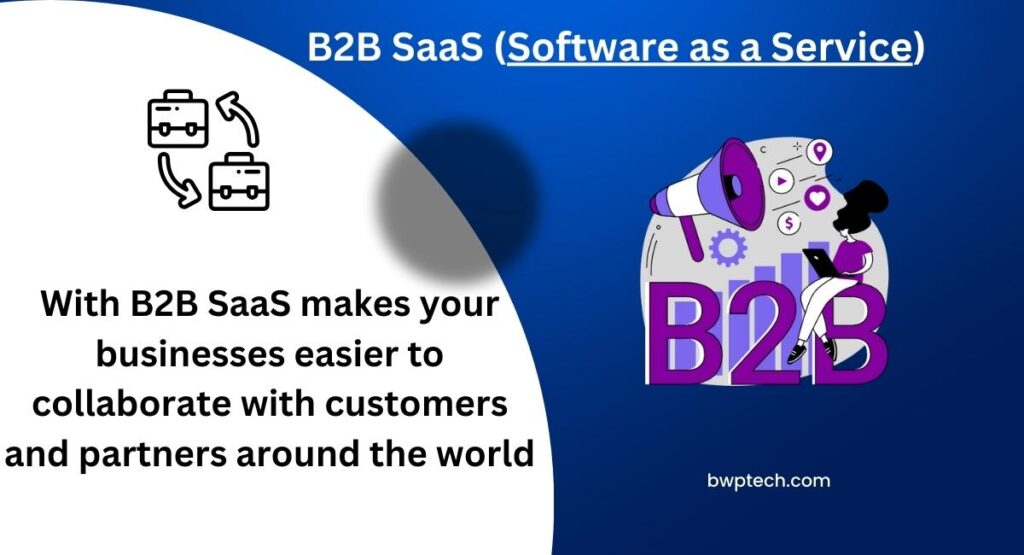
B2B SaaS also offers businesses the ability to access a range of services in one place. This includes customer relationship management (CRM), enterprise resource planning (ERP), analytics, e-commerce, and more. This makes it easier for companies to manage their operations and provide better customer service. Additionally, B2B SaaS applications are often more cost-effective than traditional on-premise software solutions.
What is B2B?
B2B stands for business-to-business. It is a type of commercial transaction between two companies, such as a manufacturer and a wholesaler, or an online retailer and a supplier. B2B transactions are typically done electronically, either through an online marketplace or through proprietary software systems used by both companies to manage their relationship. B2B transactions have grown in popularity over the last decade , as companies have sought to outsource their operations and increase efficiency.
Benefits of Using B2B SaaS for Business Owners
Business owners know that they need to be up-to-date on the latest technologies if they want to stay competitive in today’s fast-paced business environment. As a result, many are turning to Business-to-Business (B2B) Software as a Service (SaaS) solutions. B2B SaaS offers a number of benefits for business owners.
Common Business Models
Business-to-business (B2B) software as a service (SaaS) has become increasingly popular in recent years, with businesses of all sizes turning to cloud-based solutions for everything from customer relationship management to marketing automation. As a result, there are several common business models that B2B SaaS providers can use to generate revenue.
Business models are the ways in which a business produces and sells goods and services to its loyal customers. Business models for B2B SaaS (Software as a Service) can vary, but some of the most common include subscription-based pricing, usage-based pricing, freemium, open-source software, and pay-per-use.
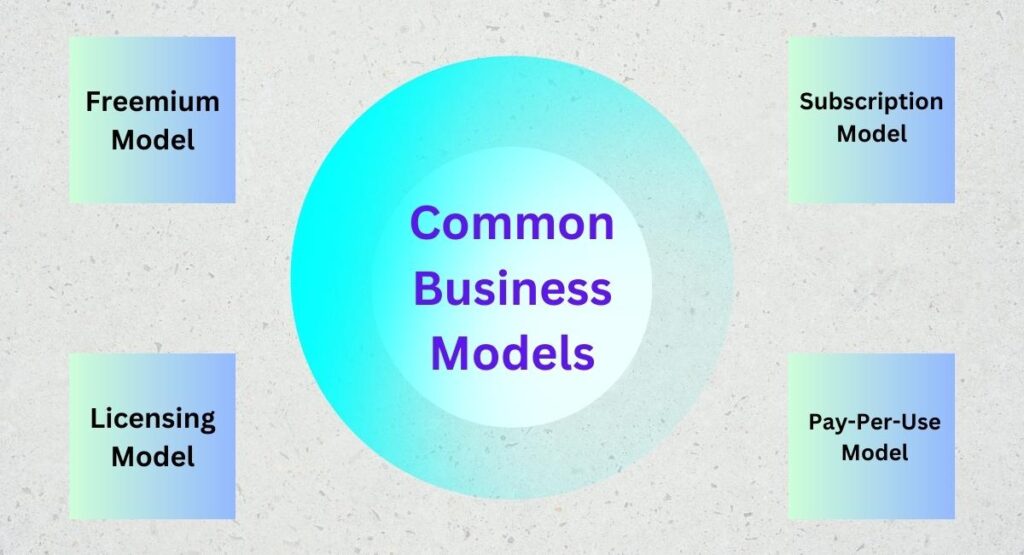
Freemium Model
The Freemium model is an increasingly popular pricing structure for B2B SaaS companies. In this model, users can access a basic version of the software for free, but must pay to access premium features. This allows companies to attract new and current customers and build loyalty from existing customers.
Subscription Model
The subscription model is an increasingly popular business-to-business (B2B) software as a service (SaaS) pricing strategy that allows customers to access services for a fixed period of time. Subscriptions can be sold on a monthly, quarterly, semi-annual or annual basis. This type of pricing helps SaaS companies generate recurring revenue while providing customers with ease of use and the ability to cancel at any time.
Licensing Model
A B2B SaaS (software as a service) company needs to have an effective licensing model in place in order for it to be successful. This model is what governs how customers access and use the software, how they pay for it, and what rights they have when using the software. It is important for any potential customer to understand how a B2B SaaS company ’s licensing model works before signing up for a service.
Pay-Per-Use Model
The pay-per-use model is an increasingly popular billing system for businesses using SaaS (Software as a Service) solutions. This model charges customers based on the resources they actually use instead of a flat rate subscription fee. It allows companies to only pay for what they need, when they need it.
Cost Benefits of B2B SaaS
The use of Business-to-Business (B2B) Software as a Service (SaaS) has become increasingly popular for businesses of all sizes, due to its cost benefits. With the subscription model, businesses can pay a fixed fee for access to services on an ongoing basis and can cancel at any time for customer lifetime. This eliminates the need for large upfront costs associated with purchasing software licenses or hardware. In addition, B2B SaaS eliminates the need for businesses to hire extra personnel to manage their software solutions, since they can access and use the software from any location with an internet connection. This helps businesses save on overhead costs, which is beneficial in today’s competitive market.
Potential Customers and Target Market
For any B2B SaaS company, understanding potential customers and target markets is essential for success. The key to unlocking the full potential of a business lies in identifying the right prospects and targeting them with solutions that they need or want. BWP Tech find potential customers from target market for their B2B SaaS companies.
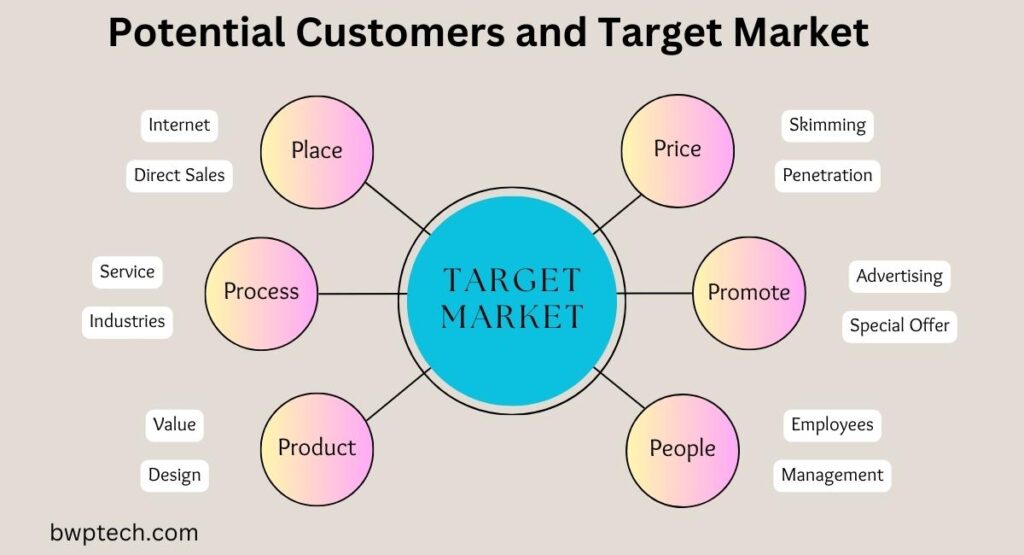
Businesses are increasingly looking to utilize cloud-based solutions as a way to streamline operations and reduce costs. As such, B2B S aaS providers should focus on targeting customers who are in need of a particular software solution, such as those in the healthcare, legal services, retail, finance and manufacturing industries. Depending on the type of solution offered, B2B SaaS providers may also find success in targeting small and medium-sized businesses (SMBs).
Identifying Your Target Market
When it comes to growing your B2B SaaS business, one of the most important steps is identifying marketing plan for your target market. Knowing who you are targeting and why can help you create a more effective marketing strategy that reaches the right audience and increases conversions.
The first step in identifying your target market is researching the type of customer you want to attract and this task is fulfill by marketing team. Get an understanding of their needs , interests and pain points. This will also help you create messaging that resonates with your target audience. You can then use this information to create targeted campaigns that attract the right customers and increase conversions.
Understanding Your Customer’s Needs and Goals
No matter what product or service you offer, understanding your customer’s needs and goals is essential for providing them with a great experience. When it comes to B2B SaaS products, this understanding can be especially beneficial since the customer’s success in using the product is often tied directly to their success in meeting their own goals.
Establishing a Relationship With Potential Customers
Establishing a successful relationship with potential customers is essential for any B2B SaaS business. In today’s competitive market, customers have more options than ever before and it is important to make sure that they feel valued and have the best possible experience when engaging with your business.
Strategies for Marketing B2B SaaS Solutions
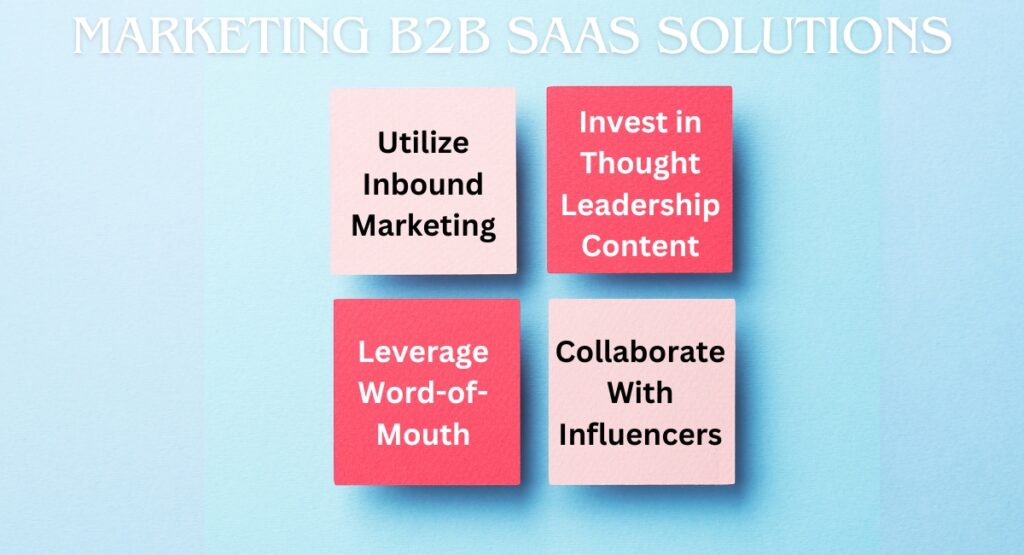
Marketing a B2B SaaS solution can be challenging because of the complexity involved in targeting and reaching potential buyers. But with the right strategies for customer success, you can reach your target audience and make sure that your solution stands out from the competition. Here are some effective strategies for marketing B2B SaaS solutions:
1. Utilize Inbound Marketing – Inbound marketing is an effective way to reach potential buyers without being too pushy. It involves creating content that is tailored to your target audience and making sure that it is easy to find. This can be achieved through SEO, social media marketing, blogging, email marketing, email campaigns, marketing campaigns, etc.
2. Invest in Thought Leadership Content – Creating thought-provoking content related to the B2B SaaS space can help establish your business as an expert in the industry. This type of content can also help attract potential buyers who are looking for solutions to specific problems or challenges.
3. Leverage Word-of-Mouth – Word-of-mouth is one of the most effective ways to spread awareness about your B2B SaaS product. Make sure that you have an easy way for customer satisfaction to share their experience with your product and reward them for doing so.
4. Collaborate With Influencers – Working with influencers who are already established in the B2B SaaS space can be an effective way to attract potential buyers. Make sure that you choose influencers who align with your brand and target audience so that they can authentically promote your product or service.
Traditional Marketing Channels for B2B Software Solutions
B2B software solutions are advanced features becoming increasingly popular in the business world, as they provide a range of benefits such as scalability, cost savings, and convenience. As a result, companies selling these solutions need to market themselves effectively to ensure they reach their target audience. Traditional marketing channels can be an effective way to do this.
Digital Marketing Strategies for B2B SaaS Solutions
As a B2B SaaS provider, it is important to have an effective digital marketing strategy in order to reach and engage potential customers. Digital marketing offers digital transformation business-to-business companies the opportunity to reach their target audience and create better relationships with them through various channels. Here are some of the most effective digital marketing strategies for B2B SaaS solutions:
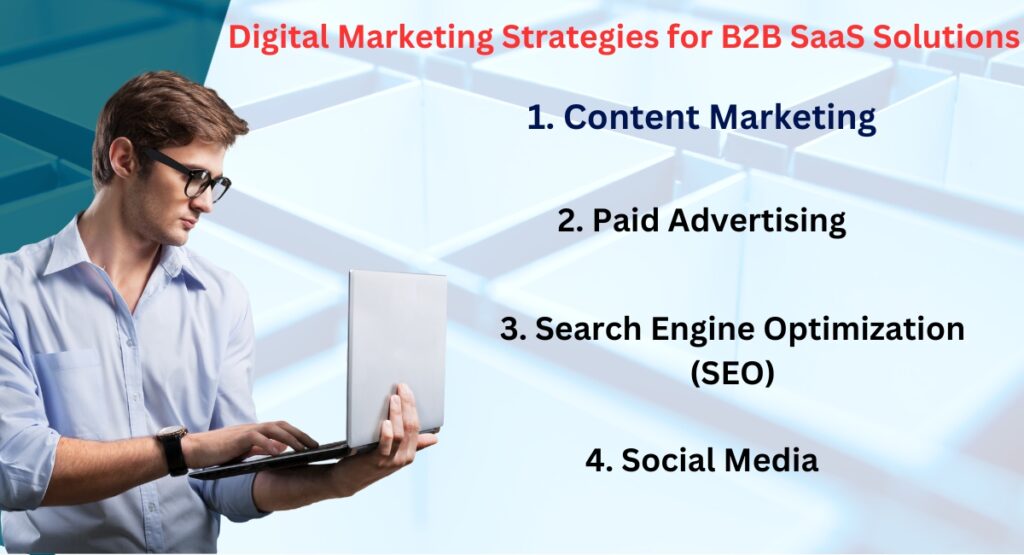
1. Content Marketing – Content marketing is one of the most effective strategies when it comes to digital marketing for B2B SaaS solutions. Creating content that is tailored to your target audience can help them understand the value of your product and establish you as an expert in the field.
2. Paid Advertising – Paid advertising, such as Google Ads or social media ads, can be a powerful way to reach potential buyers. With the right targeting, you can make sure that your ads are seen by the right people and get them to take the desired action.
3. Search Engine Optimization (SEO) – SEO is an essential part of digital marketing for B2B SaaS solutions. By optimizing your website and content for relevant keywords, you can make sure it appears higher in search engine results and get more traffic to your website.
4. Social Media – Social media is an effective way to engage with potential buyers and create relationships with them. Make sure that you create content that resonates with your target audience and post it consistently on the right platforms.
Pros:
B2B SaaS (Software-as-a-Service) is a form of cloud computing that provides software applications to businesses on a subscription basis. B2B SaaS can help companies save time, money, and resources while providing an alternative to traditional software implementations. Here are some of the advantages of using B2B SaaS:
1. Lower Cost: Lower cost is one of the primary benefits of B2B SaaS solutions. With a SaaS solution, businesses can purchase only what they need and avoid upfront capital expenses. This means that businesses can access high quality technology without breaking their budget. Furthermore, the subscription-based pricing model allows for businesses to simply pay a low monthly fee with no long-term contracts. This makes it easier to scale up or down as needed.
2. Scalability: B2B SaaS solutions are designed to scale up or down as needed, allowing businesses to easily adjust their usage according to their needs. This means that companies can add or remove users depending on the size of their team and workload.
3. Ease of Use: As B2B SaaS solutions are delivered via the cloud, they are typically very user-friendly and require minimal setup or maintenance. This makes them ideal for companies that don’t have a lot of time or resources to manage software implementations.
4. Security: B2B SaaS solutions offer high levels of security, ensuring that customer base data is kept safe from unauthorized access. Many services also provide additional security measures such as encryption and two-factor authentication.
5. High Quality Technology: B2B SaaS solutions are typically built using the latest technologies and offer a higher level of quality than traditional software implementations. This ensures that businesses can access high quality technology without needing to invest in their own resources.
Cons:
B2B SaaS (Software as a Service) has revolutionized the way businesses operate, providing them with a wide range of services, from accounting to customer relationship management. However, while there are many advantages to using B2B SaaS, there are also some drawbacks that businesses should be aware of before making the switch.
One of the cons of B2B SaaS is the cost. While it’s true that B2B SaaS solutions are often more cost-effective than traditional software implementations, they still require an ongoing subscription fee. Furthermore, businesses may find that they need to purchase additional features or user licenses in order to get the most out of the service.
Another con of B2B SaaS is that businesses are tied into the vendor’s service. This means that businesses can’t customize the software to meet their needs and may have to use workarounds if they require something more tailored. Furthermore, the vendor may not provide support or updates if a problem arises.
Finally, B2B SaaS solutions are vulnerable to cyber-attacks and data breaches. As these solutions often contain sensitive customer data, businesses need to ensure that their security measures are up-to-date in order to protect their customers.
Conclusion
The conclusion of B2B Saas is that it has the potential to be a major game changer in the software industry. With its ability to provide businesses with a single platform for managing their resources, B2B Saas offers an efficient and cost-effective solution for companies of all sizes. Moreover, the scalability of B2B Saas makes it suitable for businesses of all sizes , from small businesses to large enterprises. However, B2B Saas solutions also come with some drawbacks such as the cost and lack of customization. Therefore, businesses should carefully consider their needs before deciding if a B2B Saas solution is right for them.
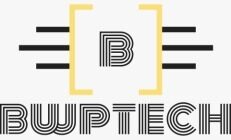


Thanks for sharing. I read many of your blog posts, cool, your blog is very good.
Your point of view caught my eye and was very interesting. Thanks. I have a question for you.
Thanks for sharing. I read many of your blog posts, cool, your blog is very good.